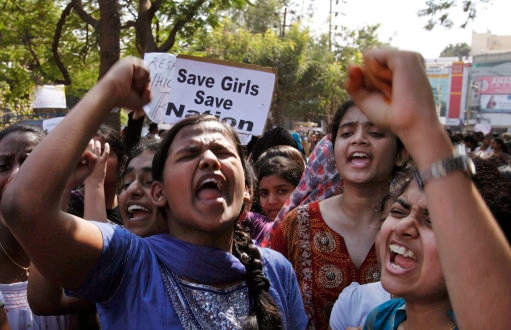A play about the 2012 Delhi rape was never going to be easy viewing and unsurprisingly Yael Farber’s Nirbhaya is painful to watch. It’s easy to close a newspaper when details are too graphic or flick a TV channel when the news becomes unbearable. But this performance is painful because it confronts the most difficult of truths in the most gritty detail. And we, as the audience in the stifling intimacy of the Southbank’s Purcell Room, were unable to look away.
Conceived by Indian actress Poorna Jagannathan and scripted by South African playwright Yael Farber, Nirbhaya is currently being performed in London as part of the Women of the Word festival at the Southbank Centre. The play tells the story of the gang rape of student Jyoti Singh Pandey in December 2012 which provoked national and global outrage.
The play sets itself a tough task. How can rape be portrayed on stage without converting it into entertainment? Farber confronts this difficulty by moulding the theatrical medium to allow the most careful and intensely personal depiction of its subject matter possible, primarily by using a cast who (apart from two members) have all suffered from sexual abuse. They tell their own stories, blurring the line between reality and performance.
Although the play gets off to a slightly weak start, the thread is soon filled with the personal accounts of the cast. This is when Nirbhaya begins to most effectively articulate its subject.
All of these personal accounts are raw and fraught, as if each actor is about to break mid-performance. Sneha Jawale’s account is the most difficult to watch. Doused in kerosene and set alight by her husband before being separated from her young son, her story is visible on her skin. It’s audible in her voice, as she speaks through tears. It is evident that this is not drama; it’s a process of translation, literally and figuratively. Her Hindi is translated into English as she moves her experience from her own body into language.
Nirbhaya touches on the global problem of sexual violence by exploring a rape that takes place in Chicago. But it is still easy to walk away from the play under the illusion that sexual violence is a problem unique to India. Worldwide, one in three women will experience rape or violence in her lifetime. Even as we condemn the events in India, it cannot be forgotten that here, in the UK, with our much smaller population, over 400,000 women are sexually assaulted each year.
We have a culture where women are objectified and controlled and become targets of sexual abuse. Although the events in India have provided an essential arena for the discussion of sexual violence, Nirbhaya leaves the global situation shrouded in silence. Farber insists that the Indian protests act as a type of ‘inspiration’. Perhaps more attention could have been drawn to the work of so many Indians in the aftermath of the rape.
Nirbhaya is not quite theatre. While the cast have adapted their stories for performance, they are not assuming roles. They are not acting. Therein lies the strength of this play; its ability to combine performance and activism, stark reality and the symbolic purpose of theatre. Nirbhaya is an important play – one that is impossible for audiences to leave behind.





Comments